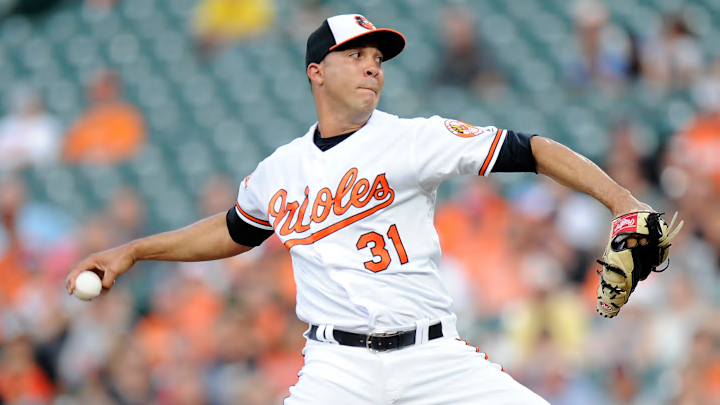Spending money to add free agents and keep your own players is an important ingredient to winning. The Orioles are no exception to this rule, with the signings of Robert Alomar, Rafael Palmeiro, B.J. Surhoff, Nelson Cruz and others contributing to winning seasons. The Orioles have also spent wisely to keep their own players, including extending Adam Jones in May 2012, Nick Markakis in 2009, and of course, Cal Ripken Jr. over all those years.
While I am a big proponent of spending money as necessary to supplement a team, the Orioles -- like every other team - have handed out their share of head-scratching contracts. Some looked awful before the ink even dried. Others appeared reasonable at the time, only to corrode the payroll in the later years. This article counts down the five worst contracts the Baltimore Orioles have handed out and looks, with hope, to a future of smarter, but unscared, spending.
(5) Mark Trumbo, 3 years, $37M

Prior to the 2016 season, the Orioles wisely acquired Trumbo from the Seattle Mariners to serve as their likely everyday first baseman. Of course, the Orioles' terrible decision to re-sign Chris Davis proved terrible for Trumbo as well, as it moved him to right field, where he was not comfortable. When acquired, Trumbo had one year left on his contract, and had a tremendous 2016 season: a .256 average, 47 home runs, and 108 RBIs.
The 47 home runs were by far a career high for the one-dimensional slugger. While this may have been a red flag to some, ultimately, the Orioles decided to bring Trumbo back on a three year, $37M deal to serve as their primary DH. Not surprisingly, Trumbo struggled in his three seasons with the Orioles, "earning" a total of -0.6 WAR. As his contract, and career, dwindled down, "Trumbo Jumbos," Gary Thorne's nickname for Trumbo's home runs, became fewer and further between.
(4) Alex Cobb, 4 years, $57M

It was not so much that signing Alex Cobb to a 4 year, $57M contract - the largest given out to a pitcher in franchise history - was a bad idea. Over parts of six seasons with the Tampa Bay Rays, Cobb had been a consistently solid starting pitcher, including going 12-10 with a 3.66ERA over 29 starts with Tampa in 2017. $14M per season for a starter of that caliber is not crazy money. And let's face it: Alex Cobb is awesome: this is a guy who famously adopted a stray dog that had been wandering dangerously close to public roads and crossing traffic near the Rays Spring Training facility.
The problem was the Orioles not recognizing where they stood as a franchise when they signed Cobb. After reaching the playoffs in 2016, the wheels began to come off in 2017, as the Orioles struggled to a 75-87 record. They entered 2018 with stars Manny Machado, Zack Britton, and Adam Jones in their final years of their contracts, with no extensions in sight.
While the Orioles tried to give it "one last go" in 2018, 2018 instead wound up kickstarting a lengthy, and painful, rebuild. The Orioles lost 115 games, traded Machado, Britton, and Jonathan Schoop, and began a "rebuild" with a solid but unspectacular veteran in Cobb earning $14M per season. It just did not make sense.
For his part, Cobb struggled with injuries with the Orioles and was eventually traded to the Angels for former prospect Jahmai Jones. Jones never made it with the Orioles. The silver lining to this story: Cobb is still a solid Major League starting pitcher, going 7-7 over 28 starts with San Francisco in 2023 and pitching to a 3.87 ERA.
(3) Ubaldo Jimenez, 4 years, $50M

The Orioles waited until the end of the 2014 off-season to make their free agent splash, signing righthander Ubaldo Jimenez to a 4 year, $50M contract and then inking slugger Nelson Cruz to a contract days later. Jimenez had pitched well in the first 8 years of his career between Colorado and Cleveland but had always experienced issues with his command.
In four years in Baltimore, Jimenez posted ERAs of 4.81, 4.11, 5.44, and 6.81 respectively. He is also notorious for serving up Edwin Encarnacion's game-winning three run homer in the 2016 American League Wild Card game, the Orioles' last postseason appearance until this season's ALDS meeting with Texas.
For Jimenez, it's not that it was a ridiculous amount of money that the Orioles spent to land him. But a team that claims to be operating with a limited budget should spent its money on more "sure thing" players, not a player like Jimenez who can look like Pedro Martinez once every month or two but have no command of the strike zone the remainder of the time.
